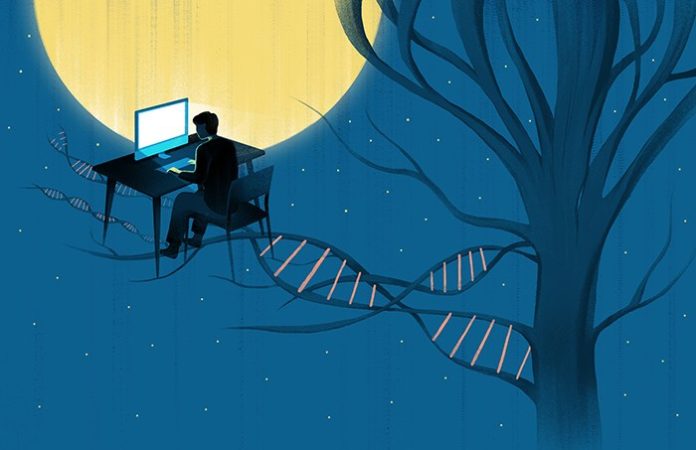
If people don’t laugh at your jokes, blame their genes. If you find it impossible to step away from shopping, blame your genes. Terrified of harmless spiders? It’s in your genes. Tone deaf? Blame your DNA.
If you can’t fall asleep until the early hours of the morning or if you force yourself to get up early to answer the ‘more’ productive early risers, your night owl tendencies could be hard-wired in your genes. Embrace it.
RELATED: Studies Show Late Sleepers Are Smarter and More Creative
Researchers at the Rockefeller University in New York City have found that a mutation of a gene called CRY1 is responsible for keeping you awake at night. The DNA mutation, they claim, alters the human circadian clock, which dictates rhythmic behavior such as sleep-wake cycles.
Because their internal clock is genetically programmed to run between 2 and 2.5 hours slower than the rest of the population, people with delayed sleep phase disorder (DSPD) have their 24-hour sleep-wake cycle delayed, which compels them to wake up and go to bed later than normal.
 In a healthy circadian clock, a handful of genes turn on and off over a 24-hour cycle. Senior author Dr Michael Young, head of Rockefeller’s Laboratory of Genetics, told The Daily Mail: “Melatonin levels start to rise around nine or 10 at night in most people. In DPSD patients, that doesn’t happen until two or three in the morning.”
In a healthy circadian clock, a handful of genes turn on and off over a 24-hour cycle. Senior author Dr Michael Young, head of Rockefeller’s Laboratory of Genetics, told The Daily Mail: “Melatonin levels start to rise around nine or 10 at night in most people. In DPSD patients, that doesn’t happen until two or three in the morning.”
Alina Patke, lead author of the study and a research associate in the Laboratory of Genetics at the Rockefeller University, remarked: “Carriers of the mutation have longer days than the planet gives them, so they are essentially playing catch-up for their entire lives.”
The researchers first identified the DSPD-linked CRY1 mutation seven years ago in a 46-year-old U.S. woman. In the latest study, they confirmed the CRY1 mutation’s link to DSPD after they found it was shared by five of the woman’s extended family members, all of whom had a history of sleep problems.
In collaboration with researchers at Bilkent University in Ankara, the New York City researchers then went on to investigate the sleep patterns of six Turkish families – 39 of the participants had DSPD and carried the mutation in CRY1, but 31 didn’t have either.
While all 70 had delayed sleep onset times, some had fractured, irregular sleep patterns. For the 31 members without CRY1mutation, the midpoint of sleep was 4 am; for the 39 members with CRY1 mutation, the midpoint of sleep was between 6 and 8 am, which suggests the night owl mutation pushed the body clock back at least 2 hours.
The Centers for Disease Control and Prevention, the leading national public health institute of the United States, estimates that between 50 million and 70 million U.S. adults have a sleep disorder. The Rockefeller researchers estimate up to 10% of people with sleep disorder experience DSPD, but not all cases of DSPD are linked to the CRY1 mutation, they assert. Patke, who is a night owl but does not carry the CRY1 variant, told Live Science:
“Not everybody who had this behavior [delayed sleep cycle] necessarily has the CRY1 mutation, but it does seem to have an effect on a large part of the population. There are likely other underlying genetic causes for the condition. Still, identifying at least one genetic mutation behind the sleep disorder represents an important step.
“Understanding how the rhythms are controlled opens the door to eventually manipulating them with drugs. If a drug is eventually found to help night owls align their sleep schedules to normal patterns, a similar pathway could be tapped to help travelers deal with jet lag.”
People with the CRY1 mutation can end up being night owls, but often the effects are much more disruptive as every cell in their body runs on the wrong time. The researchers of the study, which for the first time implicates a gene mutation in the development of DSPD, note:
“People with DSPD often struggle to fall asleep at night, and sometimes sleep comes so late that it fractures into a series of long naps. DSPD and other sleep disorders are associated with anxiety, depression, cardiovascular disease, and diabetes.
“People with DSPD also have trouble conforming to societal expectations and morning work schedules. It’s as if these people have perpetual jet lag, moving eastward every day. In the morning, they’re not ready for the next day to arrive.”
This article (It’s in Your DNA: Study Discovers Gene Mutation that Turns Humans into Night Owls) is a free and open source. You have permission to republish this article under a Creative Commons license with attribution to the author and AnonHQ.com.
Supporting Anonymous’ Independent & Investigative News is important to us. Please, follow us on Twitter: Follow @AnonymousNewsHQ




